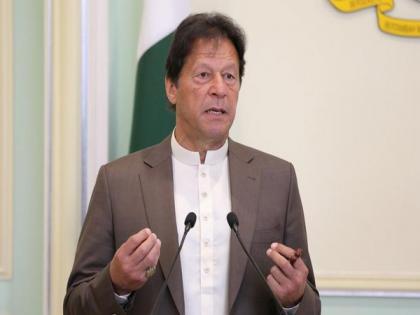Can Imran Khan be made the saviour of Pakistan's Ahmadiyya?, asks MEP
By ANI | Published: May 19, 2020 04:33 PM2020-05-19T16:33:59+5:302020-05-19T16:50:15+5:30
With the decision of the Government of Pakistan to establish a new National Commission for Minorities and the recommendation of Prime Minister Imran Khan to include Ahmadi representatives in its makeup, it is predicted that not much is going to change in the country which ensures protection to minorities.

Can Imran Khan be made the saviour of Pakistan's Ahmadiyya?, asks MEP
With the decision of the Government of Pakistan to establish a new National Commission for Minorities and the recommendation of Prime Minister Imran Khan to include Ahmadi representatives in its makeup, it is predicted that not much is going to change in the country which ensures protection to minorities.
Giuseppe Milazzo, a Member of the European Parliament said in his article that interference by Prime Minister in an Islamic country will hardly ensure the protection of the minorities including Adhadiyyas.
He wrote in EU Chronicle, "Michelle Bachelet's personal letter to Imran Khan was leaked, no doubt to draw attention to the seriousness of the threats made by his own Cabinet Ministers. However, making a personal plea and calling on the Prime Minister of Pakistan to show "good leadership" may be insufficient in delivering results. Pakistan is an inherently religiously intolerant society and the risk of violence, and further persecution exists not only for the Ahmadiyya Community but also for the Christian, Hindu, Sikh, Sufi, and other religious minorities of Pakistan".
The Islamic Ahmadiyya Community has been subjected to various forms of religious persecution and discrimination since the movement's inception in 1889.
The Ahmadiyya Muslim movement emerged from the Sunni tradition of Islam and yet in the Islamic Republic of Pakistan, they are considered, even within Pakistan's constitution, as non-Muslims.
As such the Ahmadiyya community is subjected to systematic, state-sanctioned, persecution. Pakistan has been repeatedly condemned by the international community and human rights groups for its crimes against Ahmadis.
Hundreds of Ahmadis were killed in the 1953 Lahore riots and the 1974 Anti-Ahmadiyya riots which resulted in the largest number of killings of Ahmadis.
In May 2010, the Lahore Massacre saw attacks on Ahmadi mosques and subsequent deaths of eighty-four Ahmadis.
Today, approximately 2-5 million Ahmadis live in Pakistan, which has the largest population of Ahmadis in the world. With such historic tragedies, it is no wonder that the UN High Commissioner for Human Rights was forced to act.
Writing from her office Geneva, Switzerland, Michelle Bachelet wrote personally to Pakistan's Prime Minister Imran Khan appealing to him to convey a good public message through good leadership regarding the protection for all religious minorities, including Ahmadis.
Giuseppe Milazzo said, "The UN High Commissioner for Human Rights condemned the hate and violence incited by the Pakist State Minister for Parliamentary Affairs following his tweets at the end of April stating that "Beheading is the only punishment for those who mock Prophet Muhammad." The comment was specifically targeted at the Ahmadiyya community. A week later, Minister for Religious Affairs and Interfaith Harmony, Noor-ul-Haq Qadri, joined in the efforts to further expel the Ahmadis by questioning on television on 6th May whether anyone could support Ahmadis and remain loyal to Islam or the State".
Bachelet inferred that the actions of both the State Minister and the Minister for Religious Affairs and Interfaith Harmony were purposefully intended to call out the religious extremists and incite further persecution against the Ahmadiyya community.
Bachelet also called for the protection of two Pakist Cabinet Ministers who had been threatened because they had supported the inclusion of Ahmadis in the country's proposed National Commission for Minorities.
( With inputs from ANI )
Open in app